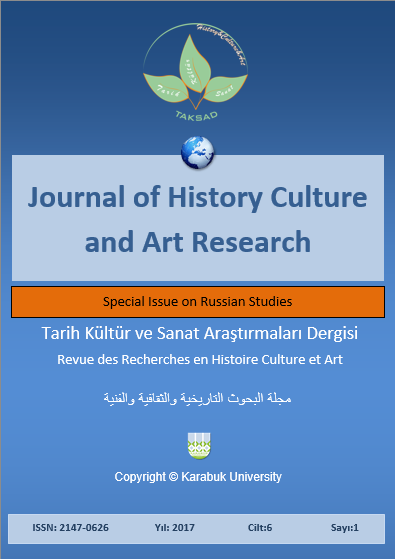Turkish Postmodernism through the “Second Wave” Paradigm: The Example of Creative Work by Hasan Ali Toptaş and Perihan Mağden
DOI:
https://doi.org/10.7596/taksad.v6i5.1267Keywords:
Turkey, Postmodernism, Narrative, Intertextuality, Poetic style.Abstract
This paper describes the aspects of Turkish postmodernism of the "second wave", which is justified by an insignificant number of theoretical works and inadequate elaboration of studies concerning the representatives of Turkish postmodernism "second wave". The exception is represented by the works of Russian turkologists M.M. Repenkova and O.V. Kareva, who consider the features of the postmodern paradigm in their studies within the novelistics of the leading representatives of the Turkish postmodernism "second wave". The representatives of the "second wave" (Hasan Ali Toptaş, İhsan Oktay Anar, Perihan Mağden, Kürşat Başar, etc.) were not the object of close research before, and therefore the consideration of their creativity as the next stage in the development of Turkish postmodernism is relevant. The "second wave" of postmodernism is characterized by the appeal to the literature of symbolic modeling in 1990s. During this period, the literature of postmodernism develops into a powerful trend, which becomes the predominant trend of the cultural life of Turkey in 2000s. It is worth noting that, if in the postmodern prose of 1980s was marked by the dominance of "lyrical stream", then in 1990s and 2000s the dominant trend was represented by narrative modification. Hasan Ali Toptaş, known for his mastery of language use, is regarded as one of the main representatives of the second wave of postmodern literature.
References
Ecevit, Y. (2016). Türk Romanında Postmodernist Açılımlar. Istanbul: İletişim.
Hamer, R. (2009). Millet Books "The Messenger Boy Murders". Istanbul: İletişim.
Kareva, O. V. (2014). Merry demolition: postmodern paradigm in the novelism by Ihsan Oktay Anar. Мoscow: MBA publishing house.
Pamuk, O. (2006). A question of conscience: Orhan Pamuk defends Turkey’s controversial female columnist. Guardian. June, 3.
Repenkova, M. M. (2010). Rotating mirrors: postmodernism in Turkish literature. Institute of Asian and African Studies. Moscow State University named after M.V. Lomonosov. Middle Eastern Literature.
Repenkova, M. M. (2016). Turkish Literature at the turn of the twenty-first century: basic paradigms. The Institute of Asian and African Studies, Moscow State University named after M.V. Lomonosov. Moscow: Science, Eastern Literature.
Toptaş, H. A. (2014). Heba. Istanbul: İletişim.
Üster, C. (2009). Yeryüzü kitaplığı. Radikal Gazetesi.
Downloads
Published
How to Cite
Issue
Section
License
All papers licensed under Creative Commons 4.0 CC-BY.- Share — copy and redistribute the material in any medium or format
- Adapt — remix, transform, and build upon the material for any purpose, even commercially.
Under the following terms:
Attribution — You must give appropriate credit, provide a link to the license, and indicate if changes were made. You may do so in any reasonable manner, but not in any way that suggests the licensor endorses you or your use.
- No additional restrictions — You may not apply legal terms or technological measures that legally restrict others from doing anything the license permits.







